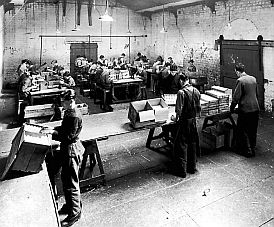James Young
1811 – 1883

chemical engineer, shale oil pioneer and founder of the petrochemical industry
Engineering Achievements
In 1848 Young was alerted to natural petroleum in the Riddings colliery in Derbyshire where he first distilled oil suitable for lubricating machinery. This small business refining the crude oil was successful, but as the coal from the mine reduced so did production. Young however noticed that oil was dripping from the roof of the coal mine and deduced that it somehow originated from the action of heat on the coal seam and that it might be produced artificially. Young succeeded by distilling cannel coal at a low heat which produced fluid resembling crude oil. Young found that, by slow distillation, he could obtain a number of useful liquids from it, one of which he named "paraffine oil" because at low temperatures it congealed into a substance resembling paraffin wax.
James Young and his partners Edward Binnie and Edward Meldrum co-founded an enterprise at Bathgate in 1850 which became the first commercial oil-works in the world, selling oils and paraffin extracted from locally-mined Torbanite (or Boghead Coal, a form of Cannel Coal). Liquid petroleum was discovered in the US in 1859 and by 1862 was being imported into Scotland at prices far lower than home-produced oils which prompted Young to buy out his business partners in 1864. He set up Young's Paraffin Light and Mineral Oil Company in 1866 in Addiewell, near West Calder. The company continued to grow and expanded its operations selling its products all over the world and earning for its founder the affectionate nickname 'Paraffin' Young.
Young also made an important contribution to the rustproofing of ships. He suggested that quicklime could be used to slow down corrosion from the acidic bilge water, and this idea was adopted by the Royal Navy.
His Life
-
1811 Born 13th July in Drygate, Glasgow to a cabinet maker/joiner
-
1830 Age: 19 Enrolled to study Chemistry at Anderson's College in Glasgow
-
1839 Age: 28 Appointed manager of James Muspratt's chemical works, Newton-le-Willows
-
1844 Age: 33 Appointed chemical troubleshooter at Charles Tennant's works in Manchester
-
1847 Age: 36 Elected to the Manchester Literary and Philosophical Society
-
1848 Age: 37 Set up his first oil business at Ridding Colliery in Derbyshire
-
1850 Age: 39 Took out patent for production of paraffine oil
-
1851 Age: 40 James Young, with his partners, began constructing the first commercial oil-works in the world in Bathgate
-
1858 Age: 47 Young opened first of a national network of offices selling paraffin oil and lamps
-
1861 Age: 49 Elected Fellow of the Royal Society of Edinburgh on 1st April
-
1866 Age: 55 Set up Young's Paraffin Light and Mineral Oil Company in Addiewell, West Calder
-
1868 Age: 57 Elected President of Anderson's College in Glasgow
-
1873 Age: 62 Elected a Fellow of the Royal Society
-
1879 Age: 68 Awarded an Honorary LLD by St. Andrews University
-
1879 Age: 68 Elected Vice-President of the Chemical Society
-
1883 Age: 72 Died 13th May at Kelly House, Wemyss Bay, Renfrewshire
His Legacy
During the lifetime of James Young, the term 'Chemical Engineer' was not yet in use and would not be so until the end of the 19th Century. Young, therefore, was classified as a Chemist. Today, however, he is widely regarded as the "Father of the Modern Petrochemical Industry" and a pioneering Chemical Engineer. The company that Young set up in 1866 moved on to pioneer the exploitation of shale oil and by the 1900s was employing 4,000 people and extracting nearly 2 million tone of shale annually. It has since been integrated into one of the world's largest Companies, BP.
More Information
Paraffin Young: the World's First Regular Oil Man David Murray, 1959
James 'Paraffin' Young: Founder of the Mineral Oil Industry John Butt, Edinburgh, 1983
The Museum of the Scottish Shale Oil Industry has much information on James Young's works at Addiewell and Bathgate.
On the preservation of iron ships. Paper by James Young in the Proceedings of the Royal Society of Edinburgh. Vol 7, p702.
The Royal Society of Chemistry donated a chemical landmark plaque to the Bennie Museum, Bathgate, in memory of James Young
Young donated his library to Anderson's College (now Strathclyde University) with funds to establish a Department of "Technical Chemistry"
Young's headstone is in the old Inverkip churchyard, Inverclyde.
Oxford Dictionary of National Biography entry (full text available to subscribers and UK library members)
-

Young's promotional oil lamp globe
-

Wicking and packing paraffin wax night lights
-

1990 image of the partially demolished laboratory buildings at Bathgate
-

Decorative candles made at Addiewell
-

Moulding machines for paraffin wax candles

